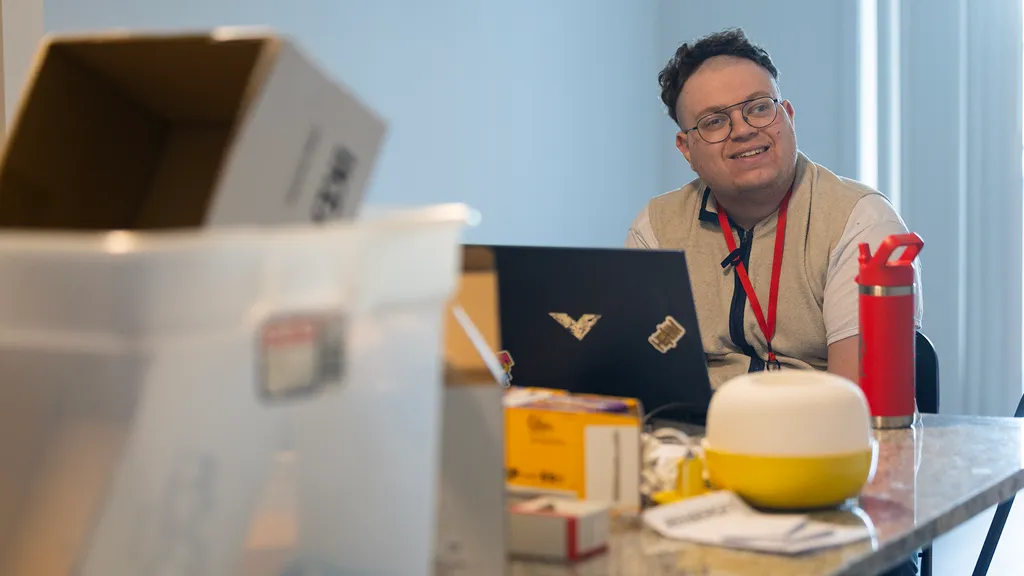- October 23, 2025
- By Annie Krakower
Amid a bustling campus and busy schedule last year, Daniel Brodsky struggled to manage his emotions, especially after his parents separated. As someone with a nonverbal learning disability, a condition similar to autism but without a language delay, he had trouble reading social cues and often pushed his sadness down.
He sought help through TerpsEXCEED—a two-year University of Maryland certificate program that allows students with intellectual disabilities to experience classes, live in residence halls and join student organizations, with 26 participants so far. With the assistance of program staff, Brodsky signed up for one-on-one and group sessions at the Counseling Center. He soon came to appreciate how his counselors took his unique identity and situation into account as they talked through his feelings.
But he knows it’s not always easy for people in the neurodivergent community like him to access mental health care.
“The environment is never really truly made for a person with a disability,” said Brodsky, who completed the TerpsEXCEED program in May. “Because of that, it may be a little bit harder to find a place that’s accessible.”

That issue is the focus of a new TerpsEXCEED project this academic year. Through “Doing Better With Mental Health,” which received a grant from UMD’s Do Good Campus Fund, psychology graduate students and other peer mentors are receiving training on effectively counseling people with intellectual disabilities, then using that information to develop strategies and tip sheets for the university’s Counseling Center, Health Center, Department of Resident Life and beyond.
“It is such a need. There’s not a lot of great mental health counseling for this population of students,” said TerpsEXCEED Director Amy Dwyre D'Agati. “There are so many nuances. It would be great to have more people interested in that field.”
Nationwide, research has shown that while people with intellectual and developmental disorders are likely to struggle with mental health conditions, including depression and anxiety, most mental health professionals lack training about treating them. Obstacles to care can show up right when a patient enters a counseling facility, especially if they communicate differently or struggle with reading, D'Agati said.
“Doing that intake form—if you’re not in crisis before, it’s really long for anybody, and it’s confusing,” she said.
To help confront this problem, TerpsEXCEED partnered with the Arc of Prince George’s County, a nonprofit dedicated to empowering people with intellectual disabilities, so interested student mentors could access its trainings on serving this community.
Then this semester, two clinical psychology graduate students used what they learned in those training modules to launch a group called the Wellness Warriors with three other TerpsEXCEED peer mentors. Throughout meetings this year, they’ll delve into different aspects of mental health, develop strategies for addressing them in this population and create a toolkit to help campus partners communicate with and provide effective care to Terps with disabilities.
“A lot of times, students with developmental and intellectual disabilities can get isolated or excluded from the larger campus culture,” said Loretta Eboigbe M.S. ’24, Ph.D. ’28, who’s working with the Wellness Warriors. “I’m excited for us to have a space to actually address some of the gaps.”
The program joins another initiative that TerpsEXCEED launched this fall: The Plus One Alumni Year, in partnership with inclusive housing organization Main Street Connect, offers certificate earners like Brodsky below-rate apartments at the new Flats at College Park complex, with mentors teaching them independent living skills like budgeting, finding jobs, buying groceries and more. The residents also can attend open office hours with community coaches and have continued support from TerpsEXCEED staff.
And as TerpsEXCEED’s partnership with the Arc of Prince George’s County grows, D'Agati hopes the benefits will extend to its alums remaining in the community.
“I’ll have support, but the support I’ll have will be more minimal,” said Brodsky, who moved into his Flats apartment this week. “It will prove to me and to others that I can live by myself.”
Terps Do Good
The University of Maryland is the nation's first Do Good campus, committed to inspiring Terps to make a positive impact now through research, public service and education. See more stories about Terps doing good at today.umd.edu/topic/do-good.
